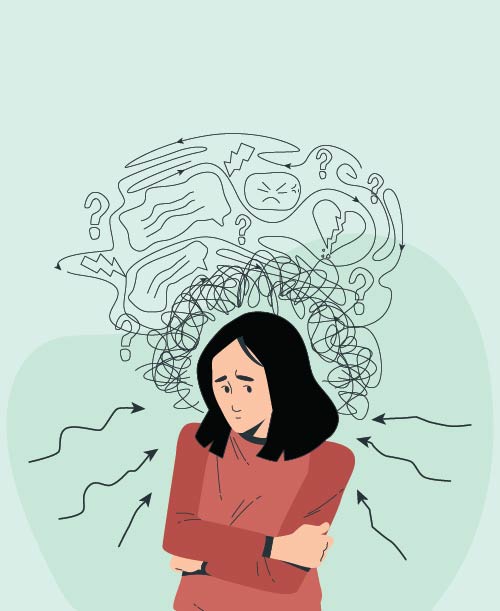

Is Sleepwalking a Sign of a Mental Health Issue?
Sleepwalking is a sleep disturbance that happens during the deepest stage of non-rapid eye movement (NREM) sleep. It is a type of parasomnia or abnormal sleep behaviour where an individual can be in a state between sleep and wakefulness. It is a common condition but not harmful. But sometimes, sleepwalking can trigger severe mental health issues impacting your relationship with your loved ones. Read on to know more.
What is Sleepwalking?
Also known as somnambulism, sleepwalking is a sleep disorder characterized by walking or performing other complex behaviours while still asleep. It typically occurs during deep non-REM sleep (stage 3 or 4 of sleep), and those who sleepwalk often do not remember the incident.
Symptoms
• Sleepwalkers appear unresponsive if you try to interact with them during an episode.
• The person may wander, walk, or even run while sleepwalking at any place.
• Sleepwalkers might engage in routine activities like getting dressed, moving around the house, or moving furniture.
• Some sleepwalkers experience sexsomnia, which involves sexual activity during sleep.
• In rare cases, sleepwalkers may urinate or even attempt to drive a car during an episode.
Is it a sign of Mental health issue?
Sleepwalking itself is not typically considered a sign of a primary mental health issue. Instead, it is primarily classified as a sleep disorder. However, there are some associations and considerations related to mental health:
1. Stress and Anxiety:
Stressful life events or chronic stress or anxiety can exacerbate sleepwalking in susceptible individuals.
2. Underlying Health Conditions:
Sleepwalking can sometimes occur in association with other sleep disorders such as sleep apnea, restless legs syndrome, or psychiatric disorders like anxiety or depression.
3. Genetics:
Individuals with a family history of sleepwalking or other sleep disorders may be more likely to experience it themselves.
4. Certain medications:
Medicines or substances such as sedatives, stimulants, or alcohol can increase the risk of sleepwalking episodes.
5. Age:
It is more common in children, especially between the age of 4 and 8 years old.
How to Cope with Sleepwalking?
If you sleepwalk, it's essential not to ignore it. Here are some steps to help you cope with this condition:
Consult a Healthcare Provider
• Talk to a healthcare provider or a sleep specialist for effective treatment.
• Address any underlying health issues that might cause sleepwalking (e.g., sleep apnoea).
• Discuss medications you're taking that could contribute to sleepwalking.
Reduce Injury Risk
• Stay away from sharp objects.
• Ensure windows and doors are locked.
• Consider setting up alarms to alert you if you start to wander during sleep.
Conclusion
Sleepwalking is primarily considered a sleep disorder related to disruptions in the sleep cycle. But, it can coexist with mental health issues or be exacerbated by stress and be a sign of a severe health condition. However, it is important to consult with your healthcare provider for proper diagnosis and treatment to overcome this health issue.
One of the important components of our overall wellness is also being financially secured. Healthcare emergencies can happen any time, but a good health insurance policy can protect you from such uncertain situations. To know more about Wellness and other health related tips, visit the wellness corner.
Source: healthline.com, verywellmind.com
Disclaimer: This blog provides general information and discussions about health and related subjects. The information and other content provided in this blog, website or in any linked materials are not intended and should not be considered, or used as a substitute for, medical advice, diagnosis or treatment. Kindly contact your Doctor before starting a new medicine or health regime.
Related Articles
8 Benefits of Mental Health Counselling
What To Do If You Can't Afford Mental Health Therapy
Can Physical Therapy Improve A Patient’s Mental Health?
From Listening Music To Practicing Yoga, Here Are 5 Hobbies To Boost Your Mental Health
Importance Of Mental Health Awareness
Published on July 05, 2024














 Health Insurance
Health Insurance  Travel Insurance
Travel Insurance  Car Insurance
Car Insurance  Cyber Insurance
Cyber Insurance  Critical Illness Insurance
Critical Illness Insurance
 Pet Insurance
Pet Insurance
 Bike/Two Wheeler Insurance
Bike/Two Wheeler Insurance  Home Insurance
Home Insurance  Third Party Vehicle Ins.
Third Party Vehicle Ins.  Tractor Insurance
Tractor Insurance  Goods Carrying Vehicle Ins.
Goods Carrying Vehicle Ins.  Passenger Carrying Vehicle Ins.
Passenger Carrying Vehicle Ins.  Compulsory Personal Accident Insurance
Compulsory Personal Accident Insurance  Travel Insurance
Travel Insurance  Rural
Rural